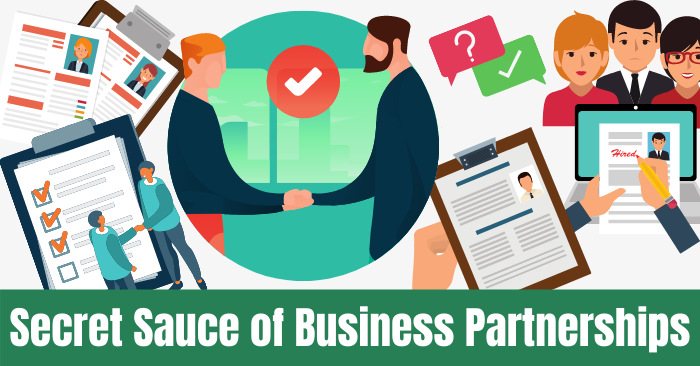
Let me start today by sharing a few short stories about different partnerships I’ve been involved with…
1. When I set up a Spanish school in Buenos Aires
2. My partnership with Steven Clayton
3. Other types of partnerships (minor equity)
4. Some key lessons learned in 20 years of business partnerships
Check out the video, then dive into the blog post below!
And here’s where you can get free access to the presentation I mentioned in the video above:
Let’s dive in!
Do you need a partner in your business? If so, what are the pros and cons? How do you find one? How do you set up such a business? More importantly, how do you evaluate whether or not a person is a good partner for you and your business?
In this article, we go deep into finding a business partner, how to evaluate and assess whether they are a right fit for you (and vice versa!), and how to make it work so that your business grows and thrives.
What Is a Business Partner?
I talk a lot about partnerships and joint ventures, but what I mean about partnerships in this case is someone who is a true partner, meaning they own part of your business. You own a business entity together. Everything is shared, profits (and loses), and ownership is shared.
It is most often a legal relationship, with a written contract, and both partners invest funds to start up the business. It can be an informal agreement (i.e. between spouses), but I strongly suggest some form of written contract.
Depending on what you agree on, partners can of course join an existing business later on, with both sides agreeing on what to bring into the relationship (usually financial) in exchange for a certain share.
In this article, I am talking about two people forming a business partnership, though three or more can certainly exist.
Why Even Consider This?
There are certainly a lot of risks involved in joining forces with another person, so why even consider this?
The fact is, nobody can do everything alone. To really “win”, to expand and scale, you always need more than just yourself.
There are plenty of stories about sole proprietors and freelancers who are very successful at their careers. However, sooner or later, most will always hit some sort of psychological ceiling. Why is this?
Simple. Doing everything by yourself is super stressful. You have to do all the creative thinking and long-term strategy, and this will often fall by the wayside if you are constantly head-deep in the tasks and immediate things you have to do to keep your business running. There just comes a point where most business owners burn out or stagnate.
You will always feel busy and overwhelmed, and it’s hard to prioritize and get anything done with no one else to shoulder the burden. There’s just a limit to what you do by yourself.
In other words, YOU become the bottleneck to the growth of your business.
Now, one obvious solution is to outsource a lot of the day-to-day operations of your business, and this is a route a lot of business owners take. It’s one I highly recommend as well.
By outsourcing (or even hiring employees), you can definitely continue growing your business by concentrating on the big strategy and letting others take care of the rest of your business.

So why even consider a partner over just hiring a VA or some employees? There are several reasons:
- A partner will be just as motivated and dedicated as you to the business. An employee or outsourced assistant will only do the tasks you assign them.
- With a partner, you can share the challenges and opportunities that come along … you share in the strategic vision, which can usually mean a more powerful growth strategy
- Outsourced workers and employees come and go. You have to retrain new ones. Your business partner is in with you for the long-haul, and you grow the business together.
However, the MOST IMPORTANT reason to consider a business partner is to find someone who is strong in areas where you are weak.
Think about it. As a solo entrepreneur, the only vision of your business is your own. Nobody is perfect in everything. You have to rely on your own creativity, perspective and skill sets to grow your business.
This is fine in the short to medium term. However, the reason why so many business owners stagnate after a while is simply because they exhaust their own vision. This isn’t a weakness of character or a flaw. It’s completely normal. You’re only human (unless you’re Elon Musk! … however, have you heard of Max Hodak? J.B. Straubel? Lyndon Rive? They and many others are all past and present business partners with Musk. Even the great Elon didn’t start his businesses alone!)
By bringing in a partner, you bring in a second perspective, a second creative mind to face the opportunities (and challenges) in your business.
It’s the old adage “two heads are better than one.”
It’s always helpful to have the advice, opinion and perspective of another person when making strategic business decisions. This keeps your business nimble, growing and better able to solve problems, as your different experiences and perspectives mean a larger variety of creative thinking and solutions.
The best reasons for a business partnership are having more than one perspective, and having somebody strong where you are weak.
If you look at the most successful business partnerships, you’ll see a common pattern … one person fills in the skills the other partner lacks. Together, they make a successful whole. Consider these companies:
Apple: Steve Jobs (outgoing, visionary, creative) to Steve Wozniak (inward, technical, analytical)
Apart, neither would have been able to form Apple into the company it is today. The company started with Wozniak inventing and building the computers, and Jobs as the salesman showcasing and selling their products.
Here are some other famous partnerships:
- Microsoft: Bill Gates and Paul Allen
- Ben & Jerry’s: Ben Cohen and Jerry Greenfield
- Intel: Gordon Moore and Bob Noyce
- Google: Larry Page and Sergey Brin
Learn more on why you should consider getting into a business partnership from this presentation you can download below for free:
Why NOT consider this?
While it’s true that partnerships can be a huge benefit to your business, there are a lot of things that could go wrong …
- If you have a falling out due to a fight or mismanagement, your business can go horribly, catastrophically, nuclear bomb-like wrong in an instant.
- Unless you’ve legally documented everything exactly (which you likely can’t), dissolving the relationship can be a legal nightmare
- Picking a bad partner who doesn’t share your vision or doesn’t compliment your strengths and weaknesses will HURT your business overall.
- In extreme cases, it can destroy your business, and destroying your business can destroy your financial health as a whole.
Are you scared?
It’s okay to be scared, but do it anyway! The upsides definitely outweigh the downsides … as long as you prepare everything.
“If you want something you’ve never had, then you’ve got to do something you’ve never done.”
To minimize the drawbacks, mitigate as much risk as you can. That means going through a proven process on how to find a great partner to minimize the risks. While I can’t get into the legal aspects and how to set up your partnership (every state, province and country are different), I’ll talk about the following:
- Picking a partner
- Organizing your work/company
- Some general legal aspects
The rewards far outweigh the risks here. Just get over it and jump in – for some this is easy; for others it’s much more difficult.
Finding a partner
To find a great partner and create (or continue) growing and scaling your business success, I have a 4-step process that works for most situations. They are:
- Find candidates
- Evaluate candidate
- Have a legal set up
- Organize the workflow

1. Finding Candidates
So, where can you find candidates? There are a variety of sources where you can actively seek out a partner for your business, including:
- Mastermind groups
- Trade shows, business development camps, related training courses
- Professional associations
- LinkedIn, forums, other networking sources
- Facebook groups
- Business relationships
- Family and friends (maybe – there are pros and cons to this)
- Joint ventures or one-off partners … by seeing how they work, you can evaluate their potential
- Past careers or jobs … tap into your co-worker pool from past and present
- Childhood and school friends
The last point, childhood and school friends, is the basis for many of the most famous businesses today, such as Apple, Microsoft, Ben & Jerry’s, Mattel, Google and Harley Davidson (childhood friends William Harley and Arthur Davidson.)
If you decide to partner with family or friends, be aware of the emotional aspect, which could either be a strength or a hinderance. If the business goes south or you begin to fight about the vision of the business, it will definitely hurt your relationship.
On the flip-side, you have a special level of trust and knowledge with a family member or sibling. Growing up together, you will know if you have a similar work ethic, and you will know each other’s strengths and weaknesses. The same is true for a spouse (at least after a few years of being together!)
2. Evaluating Candidates
The most important thing to do when evaluating potential partners is to figure yourself out first.
In order to know if your partner can complement your own values and match their strengths to your weaknesses, you must do your own self-evaluation.
If you can’t do an honest self-assessment and really understand your strengths, weaknesses, skills, values, and where you stand on a whole bunch of different places, then it’s almost impossible for you to evaluate someone else.
Self-reflection and self-assessment can be really hard for some people. Other people are naturally introspective, but even then, how you see yourself could be quite different than how you actually are.
A good first step is to evaluate yourself for at least a week while you work. It’s critical that you can say “Yes, I’m good at this,” and “No, I’m not good at that.”
As well, think of the following:
- What am I most interested in doing?
- What do I hate doing the most in my business?
- What do I have problems with?
- What are my core values?
- What are my biggest pet peeves with others?
Note your accomplishments and tasks. What are you are most proud of doing? What tasks take you out of your comfort zone? What do you absolutely avoid doing, no matter the cost?
It is very helpful to have other people give you feedback, but this could be difficult if they don’t want to be critical of you or hurt your feelings. One effective way is to ask a large group of friends, family and co-workers, and have them type out responses and send to you anonymously, such as an online poll where personal info isn’t recorded.
It is very important to not take anything negative personally. Whoever gives you feedback is doing you a favour to help you find your weaknesses.
Get access to an exclusive presentation on assessing your readiness for business partnerships below!
After you’ve assessed yourself, your potential partner must also be willing to do the same. After all, if they are thinking of partnering in a business (perhaps with you), they should be thinking of the same thing.
When looking for a partner, think of the following:
In general, this is what we’re looking for:
- Assessment is the KEY! You need some sort of starting point, and this is the best.
- Think of skills that compliment, NOT duplicate. A start-up functions best with partners of different skill sets. For instance, a chief marketing officer, a chief operating officer, and a chief financial officer would make a powerful team.
- Your individual work styles need not be the same, but they can’t clash. Your abilities should complement one another’s and offset each other’s’ weaknesses.
The biggest takeaway is that you don’t want another YOU as a partner … you need somebody with a different but complimentary visions and outlooks to strengthen the creativity and expansion of your business.
When evaluating potential partners, look for the following skills and characteristics, and think of the following 4 areas that will need to be evaluated:
Interaction Skills
How would each of you interact in the business? Who will be doing what?
Execution Skills
How would you attack a project? How would you both work during the day? How would you decide what to do?
If there’s no one in charge (since you are both equals), how do you execute a plan while working together?
Introverts/Extroverts
Who is the introvert? Who is the extrovert? It’s fine if you are both introverts, or both extroverts (though it’s best if you have one of each), but know this going in. For instance, my business partner Steve is an introvert, while I am an extrovert. Tim is an extrovert as well, but would never in a million years talk in front of an audience … but he loves talking with individuals in a crowd.
Remember, being an introvert doesn’t mean you are shy (Steve can easily talk to an audience of thousands.) It means that most of your energy comes from within, and you work better when left to your own devices.
An extrovert gains energy from being around people. They work best and gain most of their creativity by interacting with others.
Leader/Follower
This is self-explanatory, and if both of you are actively searching for a partner to build a business, you will likely both be leaders.
However, that doesn’t mean you can’t fall somewhere in the spectrum, and it doesn’t bode well for your partnership if both of you MUST be the leader. Decide this during the evaluation where each of you stand.
3. Legal Aspects
Once you decide to join forces, it’s time to draw up the contract. Unfortunately, that will involve a lawyer. We need them.

While drawing up the contract, a majority of you time will be defining all the bad stuff, such as:
- What if someone dies?
- What if someone gets divorced?
- What if you want to dissolve the partnership?
- What if someone’s not pulling their weight?
- What if someone does something really bad?
You don’t need to worry about any of this when things are going well. You only need it when things go bad. So, what do you do?
Just get through it as fast as you possibly can and deal with it. Grin and bear it.
To make it this process more bearable…
- Get a lawyer that you both like.
- Have the lawyer give you a sample of someone else’s partnership agreement
- Go through all the “what if’s”
- Spell out in ENGLISH (or your main language) to your lawyer what you both want and have agreed on
- Let the lawyer translate your agreement into a legal document
- Sign it and never look at it again – hopefully!
This should take no more than a couple of weeks, and it’s done.
4. Organizing Workflow
The biggest thing, the critical element of how to work together, is to agree on how to work on The Big Plan.
In order for the partnership to work, you all must work on and agree with the direction of the company, and what “finished” looks like in a given period of time. You must be on the same page when it comes to the big picture.
To organize the business and keep it organized, this is what we do as partners:
We go over big planning 2x per year, preferably in person (though Skype if you can’t). This will cover all projects, milestones, and a budget!
This planning session usually lasts 2 days, and we make an event of it. For instance, we will all meet in Las Vegas or London, England.
During this big planning session, we plan out at least 12 months ahead … both the big picture and milestones on how to get there.
We also do the following:
- We meet weekly to determine our progress
- We create monthly financial results
- We change the plan as needed, always with a new forecasted budget
- We plan out the next 90 days, and who does what
- We organize and plan through software such as Skype, Google docs, Basecamp and others
- We document EVERYTHING
You MUST manage the expectations of each other. Who is doing what? Can it be done? Is it a good idea? If it can’t be done, or it didn’t work out, then why? Can it be changed?
You must have these kind of conversations and meaningful interactions, but without it being confrontational and getting personal.
If you have that one person who is a strong, natural leader, let them lead. But remember that whatever you do, it is not “your” plan or “your” actions, but “ours”.
Once you are operating the business and organizing the workflow, you begin to see how important it is to have the right mixture of skillsets and characteristics.

Assessment Workshop
Below are actual questions we use in an assessment when looking for a potential business partner. When assessing, you will come up with a score in each of these 4 areas:
- Interaction (a score between 6-30)
- Execution (8-40)
- Introvert/extrovert (6-30)
- Leader/follower (5-25)
What we’re trying to do is recognize that there’s a spectrum … nobody’s either one or the other. They’re just closer to one or another.
The Process
- Take out clean sheet of paper
- For each area, come up with a score by honestly answering questions (from 1 to 5)
- Add up your scores in each area
There is no “higher is better” here. It’s just a spectrum where each has pros and cons.
The goal is to see how your scores match up.
You can be successful by yourself on any point of these scales, but the question is how the scores matchup between yourself and potential partners, and what are the potential conflicts or complements with each other.
Let’s begin! (Click here to download a printable copy)
Measurement #1: Interaction
Where are you on a scale of 1 – 5, where 1 is most comfortable and 5 is least comfortable?
- Talking with strangers in any setting – not small talk just comfort with strangers
- Recording my voice for others to hear
- Recording video of myself for others to see
- Giving an elevator pitch
- Giving a live presentation
- Giving the best man/maid of honor speech at a wedding
Measurement #2: Execution
Where are you on a scale of 1 – 5, where 1 is strongly agree and 5 is strongly disagree?
- I come up with LOTS of great ideas
- I have trouble finishing things/projects
- I love to plan
- I focus on one thing to the exclusion of all others for short periods of time
- I am NOT a detailed person
- I procrastinate a lot
- I leave things to the last minute
- I don’t use any real time management tools
Measurement #3: Introvert/Extrovert
Where are you on a scale of 1 – 5, where 1 is strongly agree and 5 is strongly disagree?
- I THRIVE when going out with my friends
- I love making small talk at parties
- I’m great at networking
- I’m good at office politics
- I hate staying home on a Saturday night by myself
- I am energized by being with others
Measurement #4: Leader/Follower
Where are you on a scale of 1 – 5, where 1 is strongly agree and 5 is strongly disagree?
- I like to be in charge
- I dislike being told what to do
- I like coordinating others
- I don’t like to have “tasks” to do
- In a group, I often take charge
Before we interpret the scores you and your potential partner got in the assessment, make sure to claim your free access to our presentation on business partnerships by clicking below!
Score Results
You should have 4 scores by the end of the evaluation, one summed up for each of the 4 areas:
The most important score is EXECUTION.
Do not partner with someone if you both score either between 22-30 or 5-13. In my experience, when partnerships go wrong, it’s most likely because the partners are not compatible with each other. The Execution area is where conflict arises the most.
For INTERACTION and LEADER/FOLLOWER, it is recommended that you’re on different ends of the spectrum with your scores. If that is the case, then you both can fill in each other’s strengths and weaknesses.
For INTROVERT/EXTROVERT, it is helpful to be on opposite ends of the spectrum … that is, one partner is an introvert, and one is an extrovert.
Remember, Apple would never have taken off if BOTH partners were like Steve Jobs (nothing technical would get done), or BOTH were like Steve Wozniak (fantastic computers, no sales.)
Share these scores and talk them through with your potential partner.
Other Factors
Stages in life
Partners in different stages of life may have very different goals. For instance, one person might be ready to take the company to the next level, while the other is ready to retire.
Geography
This isn’t usually a problem, but consider the factors if your partner is in your home town, versus your partner being half way across the world.
Long term personal goals
Do you wish to build the company and then sell it, while your partner wishes to work at it for years and years to come? This is something you will have to discuss.
Values and morals?
It’s almost impossible to really uncover the true values and morals of anyone. Personally, I think you just have to go with your gut feeling on this one.
Male/female?
Some people may care about this. Some may interact better with a partner of the same sex, while some may prefer the opposite.
Final Exercise
- Share your score with someone – a potential partner or not
- Do a mock exercise where you evaluate each other
- Talk through the potential pros and cons and why
- Discuss the “other factors” discussed above
- Come up with a decision on this mock partnership
- See how it feels working together
I’d love to hear your thoughts on business partnerships! Have you been in one before? How did you make it work? Leave a comment below.
To thriving partnerships!
Aidan







Appreciate your sharing of this important area in business. Thank you very much as I realise I need a partner to take my business to the next level. Would you care to share info relating to the partnership in 7 Figure Cycle that I followed the traiing up to a certain point.
Thanks, Jacqueline… I had the same partners (Steve and Tim) with 7 Figure Cycle. We went through the same process
Love this post, Aidan. I was in one with two friends years ago. Did not go well!! Probably because we really just went and partnered without assessing each other…
The next time I go into a business partnership, Ill be sure to go back to this post!
It’s EASY for partnerships to go wrong.. I’ve had my fair share of disasters, don’t give up on them though, they can be amazing when you find the right person/people
Very timely post as I’m looking for a business partner right now! I’ve been joining entrep groups on facebook to see if I can meet someone there, because I’m not keen to partnering with a friend/family. It’s just to avoid conflicts as you said if ever it doesn’t go well!
This was very helpful, thank you Aidan.
Thanks, Debra. Yes, definitely pros and cons to partnering with a family member or friend.
Enjoyed listening to the presentation. I just entered into a partnership this year, fairly new so fingers crossed it would grow into something like what you and your partners have!
Best of luck Anton!
Thanks for the free tool! Testing it out on myself for now while I decide if a partner’s good for me
You’re welcome!
I’ve been in a partnership for 7 years, and I can honestly say it’s been on of the best decisions I’ve made for the business (and myself!) I get to focus on operations and my partner does finance. Really boils down to picking the right one.
Nice content, Aidan.
Glad it’s working out for you Alberto!!
Don’t need a partner right now – just starting out. However, I find your blogs/lessons/advice invaluable and I appreciate that you do so.
Thank for the feedback David! Keep a partner in mind.. I don’t think it’s ever too soon to have one, although totally get where you’re coming from!